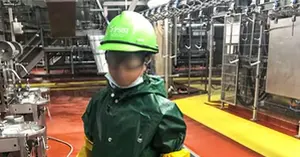
Finding a job with a criminal record proves to be a major struggle despite millions of openings
For nearly three years, Tonya Jones went on one job interview after another, only to be passed over for positions and have offers rescinded when background checks revealed a misdemeanor food stamp fraud conviction on her record.
She was removed as a driver for Lyft when the company’s background check turned up the charge, and despite her years of experience working in finance and plentiful available job openings, her main source of income until recently was delivering food for DoorDash in the Cleveland area.
“When I would try to apply for jobs that kept popping up, it was just like slamming the door in my face,” said Jones, who denies she broke the law and is fighting to remove the conviction from her record. “With that charge, nobody would give me a chance. I was just really, really, really in a dark place. It was just so emotionally draining.”
In an economy with historically low unemployment and millions of open jobs, it remains a tale of two job markets for many with criminal records who continue to struggle to find employment, according to interviews with job seekers and nonprofit organizations that work with them. They say that while employers have appeared more willing to hire workers with criminal records, a tangle of obstacles remains for those workers trying to find stable employment.
“It’s the best of times and the worst of times,” said Christopher Watler, the executive vice president of the Center for Employment Opportunities, a nonprofit organization that provides jobs and training to people who have been incarcerated. “It’s the best of times in that companies now talk openly about second-chance hiring; we have more examples of how employers can be successful hiring talent with past convictions. At the same time, we have huge barriers that remain. We have to address those barriers. It’s not the motivation of people wanting to work. Folks want to work.”
Employers want to hire, but obstacles remain
Groups that work with formerly incarcerated job seekers said employers’ interest has increased as the job market has tightened. With 650,000 people being released from state and federal prisons every year and studies showing the unemployment rate of those formerly incarcerated at around 30%, the group of workers remains an untapped source of prospective labor to fill some of the 9 million job openings employers reported in August.
“The threshold has been lowered to a certain extent by some companies because they are willing to, let's call it, take a risk that they might not have been willing to take in the past," said Ronald Day, the vice president of programs and research for the Fortune Society, which works with formerly incarcerated job seekers in the New York area. "But that’s because of the shift in the labor force. They didn’t wake up one morning and say: ‘You know what? I just want to give these individuals a chance.’”
Job candidates say interest from employers often collides with other barriers, like lack of training or job placement support and regulations preventing them from working in a variety of professions. Then there are struggles to adjust to life after incarceration, like meeting parole requirements, finding affordable housing and getting treatment for mental health conditions.
Dion Johnson ran headfirst into some of those barriers. After he attended a job fair, the Port Authority of New York and New Jersey hired him last fall to work as a janitor at LaGuardia Airport in New York. But after a month on the job, he was fired when a background check came back showing he had served six years in prison for illegal possession of a firearm, a violation that prevented him from getting clearance to work past airport security checkpoints.
“When you tell someone this is where you have to go as a punishment as a result of an act that you committed, understandable. But then you don’t provide any training or any tools or give them anything to help themselves on the way up,” said Johnson, 48, who lives in New York. “Now they’re in society and they’re going to look for work, but they can’t find anything because no one will hire them, not even as a lower-level janitor.”
In New York, like three dozen other states, it is illegal for employers to ask prospective employees about their criminal histories in the job application process. But once employers have made candidates conditional offers, they are allowed to run criminal background checks and can rescind the offers under certain circumstances based on the findings.
'They tell you no'
The Port Authority, which operates LaGuardia, started a program in 2020 focused on hiring workers with criminal backgrounds, and it has since placed 121 candidates in airport jobs, like taxi dispatcher, traffic attendant, customer service and food service, it said. But federal regulations require security clearance for access to areas past Transportation Security Administration screening locations, which can prevent some candidates, like Johnson, from getting those jobs.
The challenges are particularly acute for those with drug and violent crime offenses. Researchers at the University of California, Riverside, found about 75% of hiring managers said they were unwilling to seriously consider applicants convicted of drug, property or violent crimes in a 2021 survey.
Ella, who asked that her last name not be used, said she has had a string of rejections since she was released from prison in May after having served 2½ years for attempted murder. In one instance, she was offered a job working for the U.S. Postal Service, but after two months it was rescinded when her background check was completed.
“I felt hopeless, depressed. You feel like you’re just back at square one, and it just takes a lot of faith and your support system from your family and friends to help you out and pull you out of that bad funk,” she said. “You’ll get a whole list of all these jobs that are hiring because everyone needs help, and they’re going to waive the background check and everything like that. Then when you go through the process, they tell you no.”
The Postal Service said in a statement that it conducts background checks on all new applicants after conditional offers are made and that criminal convictions are not automatic reasons for denial. The decision to retain an applicant is based on the nature of the offense, the length of time since the offense and how it relates to the job duties, the statement said.
Before her conviction, Ella, who has her degree in mortuary sciences, was working toward becoming a funeral director. But she abandoned her plans to get her funeral director’s license after she was told she would be likely to face a period of suspension and have to pay a fine because of her conviction.
In Pennsylvania, where she lives, the state board eased its policy about granting licenses to those with criminal convictions in 2020, but it can still deny a license if it determines an offense would pose a risk to the health and safety of clients or the public.
A number of states restrict issuing licenses to people with convictions in a variety of professions — from cosmetology to social work — which can create barriers even when employers are willing to hire them.
Texas may deny professional licenses for occupations like electrician, tow truck operator and air conditioning and refrigeration contractor depending on the convictions. In Arizona, convicted felons cannot get real estate licenses while they are on probation, which can last years for some.
“You have people who have been barbers inside corrections for years, and then they come out and they try to get a barber license, and they are denied,” Day said. “That is this person’s livelihood; that’s how they make money legally and what that person has been doing for 30 years.”
Roy Ballard said he received no training while he was in prison for 16 years in California or help with his résumé or job hunting skills ahead of his release. When he was released in March 2022, he said, he was dropped off at a transit station with some money on a debit card, no identification other than his prison ID and no housing assistance.
“There was nothing, no vouchers, no help, no assistance, no list of resources, nothing,” said Ballard, 64, who worked in upper management for a food manufacturing company before his incarceration. “One of the parole agents told me that he tells the guys that come to my county, you're f’ed.”
Ballard has been able to find several temporary jobs doing highway work and with the Center for Employment Opportunities working with others who had been incarcerated. He is working on his college degree and continues to look for full-time work.
He said a variety of barriers keep people in positions similar to his from finding stable jobs — from employers unwilling to hire them to personal struggles re-entering society.
“There are so many factors in all this. Housing is a big one, your previous training, your mental health, any addictions that people still suffer with,” Ballard said. “I have encountered others who were hooked up with a job when they got out and within a week or two they were fired. They are just thrown back out.”
Signs of progress
Advocates say things are beginning to change for the better. In Michigan, the Corrections Department cannot keep up with the number of requests it gets from employers for inmates being trained through its Vocational Village program, said Kyle Kaminski, who oversees education and re-entry efforts.
"Quite honestly, we have a lot more employer demand than we have candidates at this point," Kaminski said.
The immersive, full-day training program, which lasts nine to 12 months, prepares around 400 inmates at a time for a number of trades after they are released and connects them to employers.
“When we started the first village, we had to cold-call employers and try to get them to come see it, because they just weren’t super interested. We sort of had to pull on the heartstrings,” Kaminski said. “Now the pendulum is completely on the other side. We are being called by multiple employers every week saying: ‘We need people with the following skill set. We need people coming back to the following communities. Do you have folks?’”
The demand from employers has helped improve the employment rate for graduates of the program, which went from 59% who were employed after their releases in 2019 to 71% last year.
After he lost his job at the airport, Johnson began working for the Center for Employment Opportunity and went through its job training program. After several months applying for at least five jobs a week, he was offered a job this month at NewYork-Presbyterian Hospital making $21 an hour helping people leaving incarceration get the services they need.
Jones, after having had at least 10 job prospects fall through, was recently able to land a job at a large financial company in the Cleveland area making $24 an hour, getting her back on the career path she was on before her conviction.






